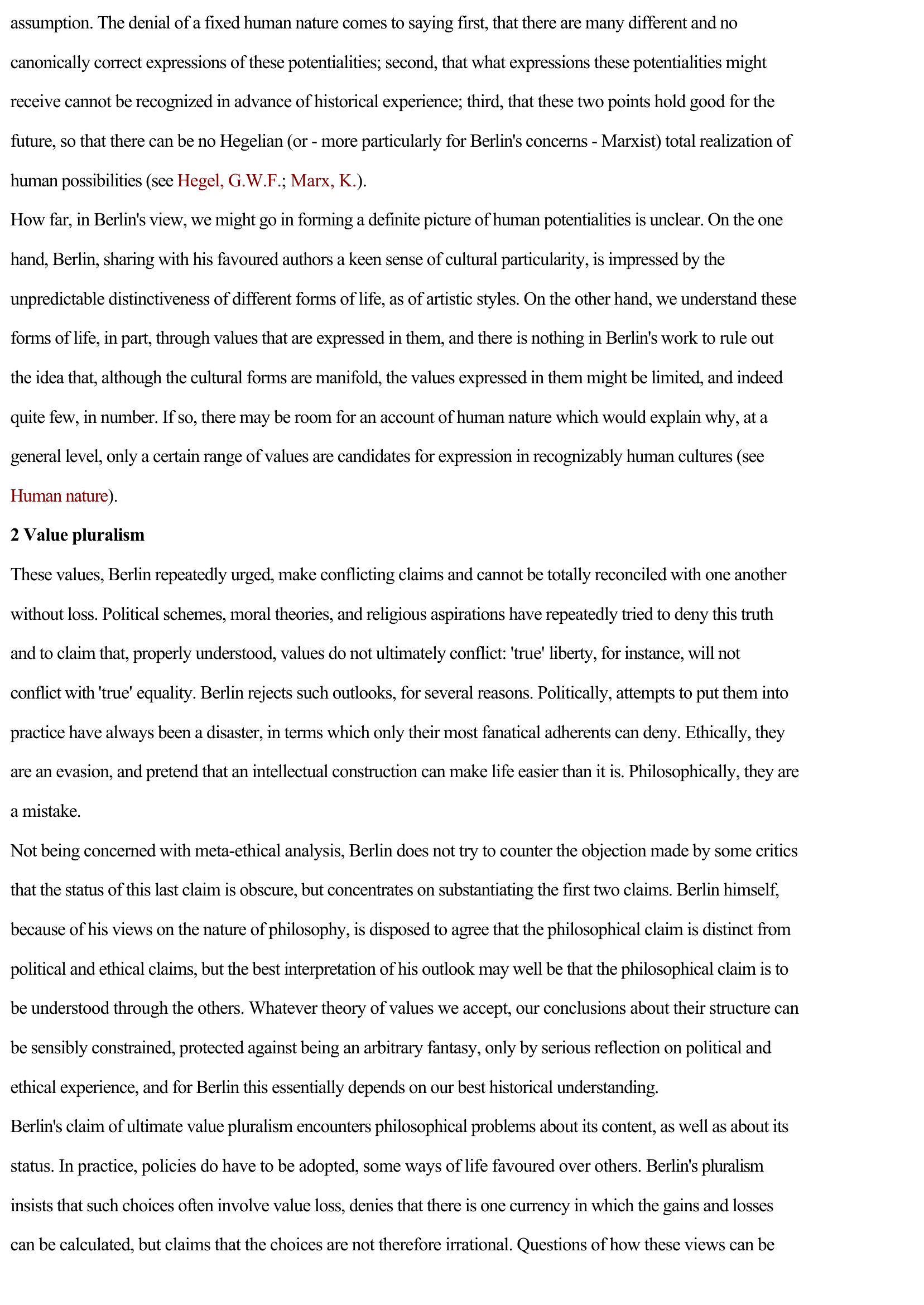Berlin, Isaiah
Publié le 22/02/2012
Extrait du document
«
assumption.
The denial of a fixed human nature comes to saying first, that there are many different and no
canonically correct expressions of these potentialities; second, that what expressions these potentialities might
receive cannot be recognized in advance of historical experience; third, that these two points hold good for the
future, so that there can be no Hegelian (or - more particularly for Berlin's concerns - Marxist) total realization of
human possibilities (see Hegel, G.W.F. ; Marx, K. ).
How far, in Berlin's view, we might go in forming a definite picture of human potentialities is unclear.
On the one
hand, Berlin, sharing with his favoured authors a keen sense of cultural particularity, is impressed by the
unpredictable distinctiveness of different forms of life, as of artistic styles.
On the other hand, we understand these
forms of life, in part, through values that are expressed in them, and there is nothing in Berlin's work to rule out
the idea that, although the cultural forms are manifold, the values expressed in them might be limited, and indeed
quite few, in number.
If so, there may be room for an account of human nature which would explain why, at a
general level, only a certain range of values are candidates for expression in recognizably human cultures (see
Human nature ).
2 Value pluralism
These values, Berlin repeatedly urged, make conflicting claims and cannot be totally reconciled with one another
without loss.
Political schemes, moral theories, and religious aspirations have repeatedly tried to deny this truth
and to claim that, properly understood, values do not ultimately conflict: 'true' liberty, for instance, will not
conflict with 'true' equality.
Berlin rejects such outlooks, for several reasons.
Politically, attempts to put them into
practice have always been a disaster, in terms which only their most fanatical adherents can deny.
Ethically, they
are an evasion, and pretend that an intellectual construction can make life easier than it is.
Philosophically, they are
a mistake.
Not being concerned with meta-ethical analysis, Berlin does not try to counter the objection made by some critics
that the status of this last claim is obscure, but concentrates on substantiating the first two claims.
Berlin himself,
because of his views on the nature of philosophy, is disposed to agree that the philosophical claim is distinct from
political and ethical claims, but the best interpretation of his outlook may well be that the philosophical claim is to
be understood through the others.
Whatever theory of values we accept, our conclusions about their structure can
be sensibly constrained, protected against being an arbitrary fantasy, only by serious reflection on political and
ethical experience, and for Berlin this essentially depends on our best historical understanding.
Berlin's claim of ultimate value pluralism encounters philosophical problems about its content, as well as about its
status.
In practice, policies do have to be adopted, some ways of life favoured over others.
Berlin's pluralism
insists that such choices often involve value loss, denies that there is one currency in which the gains and losses
can be calculated, but claims that the choices are not therefore irrational.
Questions of how these views can be.
»
↓↓↓ APERÇU DU DOCUMENT ↓↓↓
Liens utiles
- Berlin, Isaiah - philosophie.
- Islande Reykjavik Finlande Finlande Suède Suède Norvège Fédération de Russie Helsinki Stockholm Oslo Tallinn Estonie Moscou Riga Lettonie Lituanie Danemark Vilnius Copenhague Dublin Irlande Russie Biélorussie Royaume-Uni Londres Minsk Amsterdam Pays-Bas Kiev Varsovie Berlin Allemagne Pologne Ukraine Bruxelles Belgique Paris G-D Luxembourg Luxembourg Prague Rép. Tchèque Slovaquie France Liechtenstein Suisse Vaduz Berne Saint-Marin Saint-Marin Monaco M
- BERLIN, ALEXANDERPLATZ Alfred Dôblin (résumé)
- Les trésors égyptiens du musée de Berlin
- Naissance du musée égyptien de Berlin


